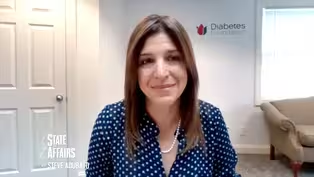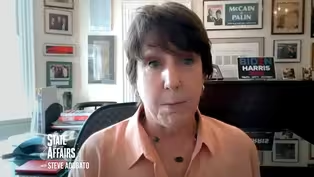State of Affairs with Steve Adubato
Reducing the Carbon Footprint of Natural Gas
Clip: Season 7 Episode 14 | 8m 46sVideo has Closed Captions
Reducing the Carbon Footprint of Natural Gas
Michael Renna, President & CEO of South Jersey Industries, sits down with Steve Adubato to talk about renewable energy development and reducing the carbon footprint of natural gas.
Problems playing video? | Closed Captioning Feedback
Problems playing video? | Closed Captioning Feedback
State of Affairs with Steve Adubato is a local public television program presented by NJ PBS
State of Affairs with Steve Adubato
Reducing the Carbon Footprint of Natural Gas
Clip: Season 7 Episode 14 | 8m 46sVideo has Closed Captions
Michael Renna, President & CEO of South Jersey Industries, sits down with Steve Adubato to talk about renewable energy development and reducing the carbon footprint of natural gas.
Problems playing video? | Closed Captioning Feedback
How to Watch State of Affairs with Steve Adubato
State of Affairs with Steve Adubato is available to stream on pbs.org and the free PBS App, available on iPhone, Apple TV, Android TV, Android smartphones, Amazon Fire TV, Amazon Fire Tablet, Roku, Samsung Smart TV, and Vizio.
Providing Support for PBS.org
Learn Moreabout PBS online sponsorship[INSPRATIONAL MUSIC STING] - We're now joined by Mike Renna, President and CEO of South Jersey Industries.
Mike, good to see you.
- Great to see you, Steve.
Thanks for having me.
- You got it, tell everyone what South Jersey Industries is.
- So, South Jersey Industries is a energy holding company based out of Folsom, New Jersey, which is down by Hammonton.
We own two natural gas utilities in the state of New Jersey, South Jersey Gas Company and then Elizabethtown Gas Company.
In addition, we've got a number of non-utility businesses primarily focused on renewable energy development.
- The connection between South Jersey Industries and the Governor's Clean Energy Plan, and your interaction with the New Jersey Board of Public Utilities, please talk about it.
- Sure, look, you know, the Energy Master Plan is something that every administration does.
It's a blueprint for that administration's view of energy and energy use in New Jersey.
Back in 2019, the governor put out the Energy Master Plan for his first term, and that included a, I think a rather unprecedented, in this state, move, towards renewable energy and decarbonization, all things that, as a utility and someone who's proud to serve, you know, 700,000 plus homes and businesses in the state, we welcomed.
So our job was really to try to figure out how we fit, and really not just fit in terms of the energy's future and the energy transition, but what ways our infrastructure can help to accelerate it.
And that's really what we've been focused on for the last four years, now I'm going on five years, and all of that is done in partnership with our regulators at the Board of Public Utilities.
- Mike, do us a favor, give us one concrete example that moves this conversation from a policy conceptual conversation around clean energy and decarbonization, if you will, our carbon footprint, to a tangible, practical, relatable example of what needs to be done and how you and your colleagues at South Jersey Industries are involved, go ahead.
- So I can give you three, right?
And they're all interrelated, so if you look at a natural gas utility, right, our primary assets and focus is really the infrastructure.
It's the energy delivery system under the ground that currently brings natural gas to your home or your business.
The ways that we can really help to accelerate decarbonization and this energy transition, the first is by modernizing our system, right?
The more that we can reduce leaks on the system, the less methane, fugitive methane that gets into the atmosphere, which is a very potent greenhouse gas.
We've invested billions of dollars to modernize our system and now have the lowest leak count in our history.
South Jersey Gas Company, we're in like, the 20 range in terms of leaks, where, you know, just a few short years ago, that would've been in the hundreds.
So that's one, the other is energy efficiency.
We are actually incented to help customers reduce energy, right?
So, I mean, the easiest way to reduce emissions is to use less and to burn less, right?
So we are incentivized, we have a number of programs that help customers become more energy efficient and use more gas, and our profitability has been really delinked from usage.
So that's how we are incented to help customers use less energy.
Third is now what's called renewable natural gas, and that is taking methane from other organic sources, landfills, wastewater treatment facilities, food waste.
We don't have a lot of them in New Jersey, but we're very active in the dairy space, right?
Taking the manure from dairy farms and converting into what is a usable and blendable gas that can go right into the gas stream, has a huge impact on the level of carbon in the gas.
- Mike, go back again, the dairy farm thing, the dairy farm renewable energy thing.
I keep trying to understand this.
I did not do well in science in high school or college, so go ahead.
- That's okay, I didn't either.
I took a visit to a dairy farm for me to fully appreciate it.
So when you think about it, right, the farms that we're investing, they have anywhere from 3,500 to 11,000 heads of cattle, right?
And so it's an enormous operation.
In fact, one of the ones we're involved in, it's a 20 acre barn, and it's just filled with milking cows, and those cows produce a lot of waste.
That waste is traditionally just sent to a lagoon where the methane, as it, you know, as it decomposes, the methane is then flared into the atmosphere.
So it really doesn't have any, you know, the environmental impacts, right, are not mitigated or curtailed in any way.
What we're doing is adding an anaerobic digester to the facility where the manure will go, as opposed to a lagoon.
And that manure will be treated through heat and through the injection of, really, bacteria, and it'll produce a solid, a liquid, and a gas.
The solid becomes their bedding, the liquid becomes fertilizer, and the gas becomes a gas that you can blend into the natural gas pipeline and mix with geological natural gas and brings down the carbon content.
- First of all, thank you.
No one has explained that as well as you just did.
Mike, let me ask you this.
For those who don't buy into the carbon footprint issue, the climate change issue, the decarbonization issue, and think it's, quote, "Political," well, I guess everything's political, but there's real science here, is there not?
- There is.
Look, you know, I mean, that's the thing, right?
We have, for the last four years, really kind of repositioned the company, and, you know, while we are a utility, and right now, the product that our utility delivers is geological natural gas or conventional natural gas, right?
We are ultimately an infrastructure company.
We're agnostic to the molecular content of that fuel.
If we can safely blend other organic, you know, gases and/or hydrogen into our gas stream safely and bring down that carbon intensity, you know, we're all for it.
Because yeah, I mean, look, this is real science.
Natural gas is a very clean burning fossil fuel, but it is still a fossil fuel, and it does, you know, it has a methane component to it, that's when it combusts.
So, you know, we're looking at doing everything we can to help to, really, as I said, accelerate this energy transition.
You know, Steve, look, one of the things you have to think about too is people talk about electrification, and the problem is that infrastructure doesn't exist yet.
Whether it's the windmill off the shore or the transmission to move those electrons to homes and businesses, all of that infrastructure still has to be built.
The one advantage we have, and I keep using this word accelerate, is our infrastructure exists, and it's capable of removing these lower carbon fuels, and that's how we really try to position our company.
- Mike Renna, President and CEO of South Jersey Industries.
Mike, we appreciate you joining us.
It will not be the last conversation we have on this topic.
- Great.
Thanks Steve.
- I'm Steve Adubato, that's Mike Renna.
Thanks for watching, we'll see you next time.
- [Narrator] State of Affairs with Steve Adubato Is a production of the Caucus Educational Corporation.
Funding has been provided by Horizon Blue Cross Blue Shield of New Jersey.
The Healthcare Foundation of New Jersey.
The Russell Berrie Foundation.
New Brunswick Development Corporation.
New Jersey'’s Clean Energy program.
PSC.
The New Jersey Education Association.
Atlantic Health System.
And by The New Jersey Economic Development Authority.
Promotional support provided by ROI-NJ.
And by New Jersey Globe.
- (Narrator) New Jersey is home to the best public schools in the nation, and that didn't happen by accident.
It's the result of parents, educators and communities working together year after year to give our students a world class education.
No matter the challenge, because parents and educators know that with a shared commitment to our public schools, our children can learn, grow and thrive.
And together, we can keep New Jersey's public schools the best in the nation.
The Significant Complications of Living With Diabetes
Video has Closed Captions
Clip: S7 Ep14 | 8m 21s | The Significant Complications of Living With Diabetes (8m 21s)
Violence Towards Women in Politics and Proper Representation
Video has Closed Captions
Clip: S7 Ep14 | 10m 35s | Violence Towards Women in Politics and Proper Representation (10m 35s)
Providing Support for PBS.org
Learn Moreabout PBS online sponsorship
- News and Public Affairs

Top journalists deliver compelling original analysis of the hour's headlines.

- News and Public Affairs

FRONTLINE is investigative journalism that questions, explains and changes our world.












Support for PBS provided by:
State of Affairs with Steve Adubato is a local public television program presented by NJ PBS

